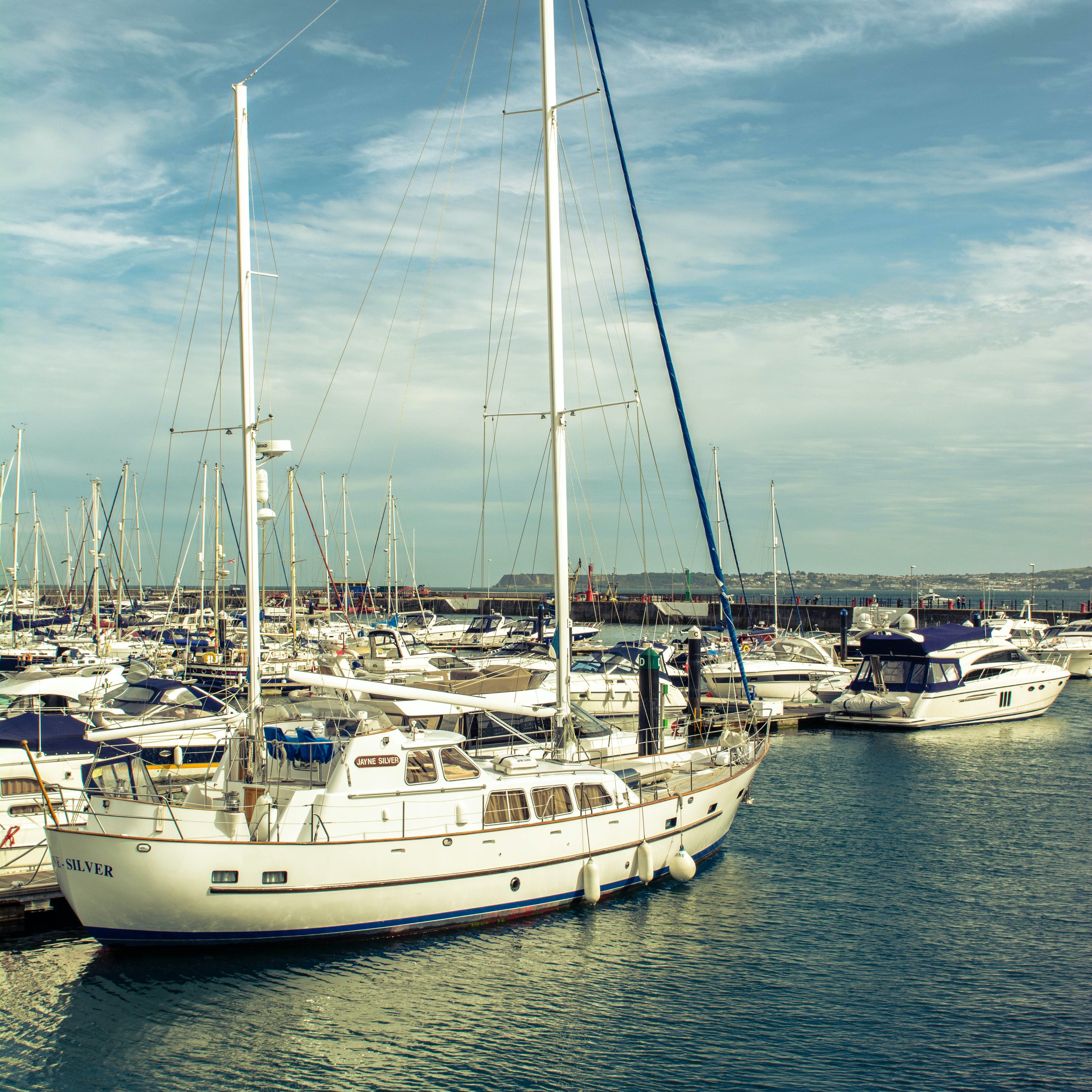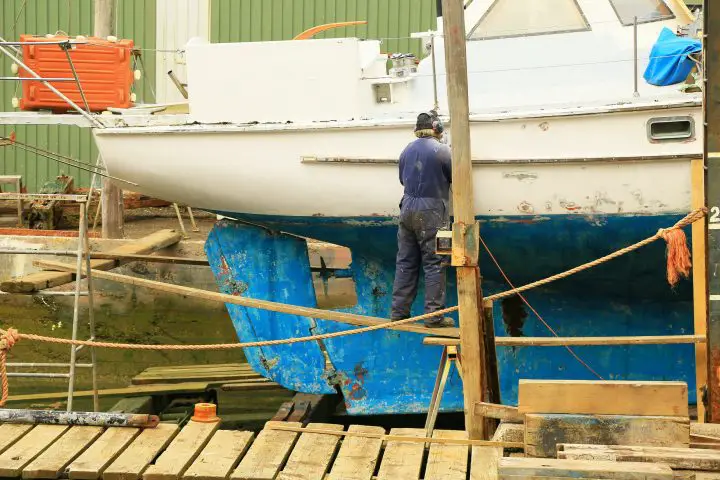Let’s talk about real-life boat ownership and living on a boat full time. My wife and I have lived on our boat for nearly eight years, doing everything from full-time living on a boat in a marina to cruising The Islands of The Bahamas for months.
For starters, everything you’ve ever wondered about living on a boat probably doesn’t scratch the surface of everything you’ll learn. This lifestyle isn’t for everyone; for every wonderful day on the water, there’s a stressful situation or broken boat part.
So what does living on a boat full time look like? Here’s a glimpse into the world of the liveaboard.

Table of Contents
- What Are the Pros and Cons of Living on a Boat?
- Common Issues with Moving Onto a Boat
- Paths to Moving Aboard
- Living on a Boat Full Time FAQs
What Are the Pros and Cons of Living on a Boat?
It is often said that there’s a wide gap between the romantic vision that many people have of the liveaboard lifestyle and the nitty-gritty reality.
Here are the pros and cons of living on a boat full time, taken from our personal experiences.
Should I Live On a Boat? Absolutely Yes, Here’s Why! (Pros of Living on a Boat)
Living on a boat is sometimes even better than your most romantic vision. Dolphins frolicking while the sunsets, tropical drinks in your hands, and nothing but crystal clear water between you and the most spectacular island beach you’ve ever seen. Yes, that all happens, sometimes.
- Freedom to go where you want, when you want
- Travel as much or as little as you want
- Take your house with you as you move
- Changing scenery, waterfront property where ever you go
- Wildlife visits—seals, whales, dolphins, birds
- A friendly community of other boaters
- Learn to live more simply, with only the necessities
Never, In a Million Years, Should Anyone Ever Live on a Boat!! (Cons of Living on a Boat)
Everyone has good days and bad days. We’ve often described boat life as having high highs but very low lows. The peaks and valleys of boat life (crests and troughs?) are just much farther from baseline-normal.
For every dolphin, there is a broken toilet joker valve leaking sewage onto the bathroom floor.
For every idyllic island beach, there is a fouled diesel filter that needs changing.
For every smooth downwind passage, there is a sloshy, windless mess of flapping sails making everyone on board seasick.
The list could go on and on and on.
- Constant maintenance and cleaning
- Difficulty finding skilled, professional labor
- Small spaces, no storage, no privacy
- No dishwashers, washing machines, dryers (usually)
- Away from docks, you always have limited power and water
- Constant exposure to the weather
- Tax and insurance issues
Common Issues with Moving Onto a Boat
Here are some of the biggest issues we have noticed from our experiences and those around us. While everyone’s experience of living on a boat full time differs, everyone seems to have similar issues.
There’s More Than One Way to Live On a Boat
First, it has to be said that everyone’s experience is different. And that’s most obvious by looking at what sort of boat they choose and where they choose to live on it.
Many books have been written on the subject, and most like to divide boaters into three groups based on their budgets. There are the high-lifers who can afford to buy a new or newish boat that is large and comfortable. They can afford to live at a resort marina and likely hire professionals for most maintenance and cleaning tasks. They likely spend most of their time in marinas if they travel far.
Then there are the Goldilocks boaters—not too big, not too small—making up the “middle class” of boating. There’s a healthy mix of DIY projecting with some professional help on the big projects. They might liveaboard at a marina or travel full-time. They might live at docks, anchor, or a mix.
And then there are the budget boaters. Cheap boats are easy to come by if you’re willing to use DIY labor to fix them up. They are most likely to anchor out to minimize costs.
All these people live very different lives on their boats, but does it matter? The costs are astronomically different, but they could be visiting the same ports, seeing the same sights, and even sharing the same experiences.
What’s most amazing is how everyone perceives their liveaboard situation. I’ve been to dock parties where couples on 60′ catamarans complain that they have no personal space and must take a break from being on the boat together after a few months. Meanwhile, I know a family of five (plus two dogs) that live on a 40′ monohull with less than 1/3 the space of the catamaran. They have issues, but they’re pretty happy five years later.
(Speaking of catamarans, check out my recommendations for liveaboard catamaran options.)

There’s a Steep Learning Curve
Year one of boating is the worst. There’s so much to learn; it’s all new and different than anything you’ve done before. There are all the sailing terms you must learn, but there are also boat maintenance tasks and understanding how all the systems on your boat work. Then there are the basics of seamanship and how to operate your vessel safely. It is a lot to take in.
And the basics of living on a boat are different from land life. Your kitchen (galley) is much smaller. The toilet doesn’t flush like a regular land toilet. You’re always thinking about minimizing water use when showering or doing dishes. If you turn too many electrical items on, circuit breakers pop. The list goes on and on, and when you’re new, it’s stressful.
Once you’ve got the kinks worked out, learned your boat systems, and successfully traveled and lived on your boat for a while, things get much better. You know more, your boat is set up the way you need it, and you have the confidence to start enjoying yourself. Some people take a few months, some a year, and, unfortunately, some never get there.
It’s Kind of Like Camping
Boats are small spaces, but the truth is that living on a boat is more like camping than most boaters like to admit. You get by with only a few items in your wardrobe. You skip showers since you don’t always have hot water. You don’t have space for all the luxuries of home. No dishwasher. No washing machine. Everyone is occasionally uncomfortable onboard, whether from the weather or the cramped quarters.
Boats are also hard on relationships. While there’s something romantic about being cozy and alone together at sea, it isn’t so romantic on day five, or thirty, or sixty. Personal space is non-existent on most boats. It’s inevitable that your significant other—or anyone else—will drive you nuts after some time. Boats have ended more than one marriage that we know of.
The cramped living space on a boat poses other problems, too. Downsizing is important because you simply can’t bring it all with you—there’s no storage space. What is important, what’s nice to have, and what will you use on a boat? Living on a boat forces you to live with the minimum and acknowledge what you need to survive.
Living on a sailboat is, of course, drastically different than living on a luxury yacht. But all these problems seem relative, and no matter what size your boat is, everyone has the same complaints.
Constant Maintenance and Cleaning
Boats are always trying to sink and fall apart. The ocean helps them with its corrosive saltwater and constant motion. The only thing keeping it afloat? You, the lowly and unprepared new boat owner. Yikes!
Even if you have mechanics and boatyard workers do most of the big projects for you, there’s still a ton that you’ll wind up doing on your own. Just day-to-day cleaning on a boat is a big deal. Everything is more difficult and takes longer than it does on a house.
Somehow, boats seem to get dirtier faster than houses do. From polishing the hull, shining the stainless, varnishing the teak, and scrubbing the scum line to everyday things like dishes, sweeping the floors, and cleaning the bathroom, boats are dirty, and it takes time to keep them clean.

Weather Drama
The weather plays a bigger part in your life than you’ll even imagine. Most of us pay remarkably little attention to the weather when we’re on land. If it’s hot, we might just minimize our time away from air conditioning. If it’s raining, it’s a minor inconvenience. We never think about the wind or tides.
But everything on a boat revolves around the weather. Every day we look at the weather for the upcoming week. Forecasts are often inaccurate, so we expect it to change. But what should we be ready for? When cruising, we often track weather systems over a week away and start planning.
This week, it says we might get gusts to 52 knots (!!!) from the southwest with heavy rain and thunderstorms. We’re anchored and away from the dock. Will our anchorage be protected from winds like that? Is the holding good here, or is there a safer place we should move to? Should we think about moving there early in case it fills up with boats?
We go through this exercise every week or two, no matter where we are. When approaching an anchorage, it’s all about the wind direction, tide level, and whatever else is happening. Are we okay with being stuck here for a few days if it’s foggy? A week? What if we need south winds to reach our next destination, but the forecast only has east winds? Do we wait or change our destination?
The amount of attention it takes and the flexibility of your schedule is mind-boggling to most landlubbers. When friends want to visit us, we tell them we can meet them in a specific place or at a specific time, but not both. If you want us to meet you, you’ve got to be flexible too!
The Legalities of the Live Aboard Life
What do you legally need to do to live on a boat full time? Most people’s home or apartment is their legal residence and domicile. It’s listed on their driver’s license, and it’s where they vote and pay taxes.
How will all these issues play out when you move onto a boat that moves around? There are mail forwarding services that allow you to set up residency. We use St. Brendan’s Isle in Florida since we were already Floridians, but there are also similar services in other states. This at least gives you the ability to have a driver’s license and vote.
Taxes are a little more complicated. You can register the boat at your address in Florida, but each US state collects its own use tax. If you use your boat in their state for over a few months, they want to tax it. It’s not a problem if you move around, but what if you want to leave your boat in New York for the summer? Then you might have to register it there and pay taxes.
Additionally, many counties in the US collect personal property tax on boats. We know of several places where if you are in the county on January 1st, you’ll owe the county property tax. If you were one county away where the tax happens to be zero, you would owe nothing. Tricky!
Recreational boat insurance is another matter of concern. It used to be fairly easy to insure a boat, especially a cheap old boat. If you have a homeowner’s policy, you can easily add the boat. But if you’re a liveaboard with no real land address, getting insurance is becoming a problem. If the boat is too old, you’re traveling to distant ports, or the boat is very large, and you’re first time boat owners, it can be hard to find an underwriter.
Do you even need insurance? Many marinas and boatyards now require it. Gone are the days when you could sail the world and “self-insure.” But, honestly, those days never really existed. If your uninsured $5,000 sailboat drags anchor and puts a gash in a $5 million yacht, a serious legal headache will follow. Many owners of older vessels keep “liability-only” insurance, but even this is getting less affordable and hard to come by.
Cost of Living on a Boat
Many folks who want to try boat life are understandably curious about the average cost of owning and buying a liveaboard sailboat. Is it cheaper to live on a boat than a house? That’s a tough question to answer. For one thing, people’s expectations and their needs for comfort and security vary widely.
Both houses and boats can be found for about the same amount. If you’re in the market for a $250,000 house, you could find a nice boat for that amount. It would, of course, be much smaller and—unlike the house—be a terrible investment. So while you might be able to get a loan for a house (which makes excellent collateral for the bank), getting a loan for a boat would require a bigger risk on the part of the bank and therefore cost you a lot more.
On the cheaper end, you could find a fixer-upper boat on Craigslist or Facebook Marketplace for far less than a neglected house. A house will always have some value based on the land, whereas a boat can become valueless. It’s not uncommon to hear of people getting free boats abandoned in boatyards, making ridiculously low offers on neglected vessels, and getting large boats for a few thousand dollars. People are always wondering how to get rid of an old boat.
These fixer-uppers have their own stories, of course. Many YouTube channels are dedicated to the cheap boat fix-up scheme. Project boats can be wallet-shrinking and soul-sucking. Taking on a project is a good way to lose a lot of money, along with years of your life and any interest you ever had in boating. Project boats are not for most people.
Both boats and houses have taxes and insurance, so those costs are probably very similar. Tax laws vary by state and county. In some places, you won’t have to pay any tax on your boat except for the initial sales tax at the time of purchase. You will have to pay an annual personal property tax in other locales.
You’ll also have to pay for boat parking. Marina, mooring ball, or in the boatyard—all will come with a monthly bill. The house or apartment will not have storage fees, so there’s no equivalent here. But, if you bought a cheap boat for cash and are only paying monthly liveaboard slip fees, this might be less than a mortgage payment would be.
If you’re traveling and anchoring, you can generally do that for free. However, most cruisers spend a few nights a month at marinas. That averages about the same amount they’d pay for monthly dockage since nightly transient rates are high.
Both boats and houses have maintenance and upkeep expenses, but boats generally have more. It’s generally estimated that you should budget ten percent of the boat’s purchase price for annual maintenance. If you bought a $50,000 boat, this would be $5,000 yearly. That holds for most boats, but year one will be higher as you fix neglected items and make your upgrades.

Paths to Moving Aboard
From our experience, we’ve seen people take two paths towards the liveaboard life.
- Some folks own their boat and use it for weekends or a week’s vacation here and there. They move aboard full-time as they transition to retirement, a work sabbatical, or remote work. Since it’s a gradual transition, these folks generally know what to expect.
- Then there are the folks who go all in—they know nothing about sailing or boats and sell it all and move aboard. For them, it’s a jump into icy cold water or learning a new language by moving abroad.
Which group is more successful? Group One generally knows what to expect, has worked out the kinks in their boat, and has already tackled the learning curve. There’s still a lot to take in, but they’re generally less stressed by it. If you can spend some time on your boat enjoying boating before moving onboard, it’s generally a good thing.
But, either way, being a full-time liveaboard is not a long-term lifestyle for most people. People who start from both groups seem to last an average of about one and a half to three years. After that, they’re ready to either sell the boat and move on or buy an RV or vacation land home that allows them to divide their time between boating and something else. People who last more than three years with only a boat are a very small minority.
One parting thought: Living on a boat full time and traveling is like having three or four full-time jobs. Each requires 30-40 hours per week when you include labor, research, and thinking and planning.
- Boat ownership — basic maintenance and cleaning
- Cruising full-time — destination and route planning, weather study
- Living aboard — cooking, cleaning, shopping, and everything else takes so much longer on a boat than in a house
- Your actual job — if you work aboard
Living on a Boat Full Time FAQs
How much does it cost to live full time on a yacht?
A lot depends on the size of the yacht. A small sailboat can be found fairly cheaply. For around $50,000US, you can get an older 35-foot sailboat in decent condition and move aboard with few problems. The biggest issue is finding a marina that allows live-aboard boaters. Slip fees will be your biggest expense and can be as high as $1,500 monthly in some areas. However, you can get monthly slips for as little as $300 in other places.
How to stay organized on a sailboat?
Sailboats have small spaces and not much storage, so keeping organized is key. The first step is to downsize your possessions to the bare minimum—only take what you absolutely need. The less you have, the easier your life aboard will be.
After that, it’s a matter of packing the boat so that everything has its place. Some boaters like to keep a spreadsheet of where they’ve packed everything away so they can find it quickly.
Is it cheaper to live in an RV or a boat?
Both of these activities are very dependent on location. Purchasing either one is very similar in cost. RV parks and marinas charge similar prices, but the cost varies depending on the location and services. In the end, however, moving an RV somewhere cheaper is easier and quicker, so you can live somewhere cheaply more easily.
